coaching fiasco 2015
There won't be another one after. Not for Gardner. Not for Jake. Not for Hoke, for whom the accumulated effects of progressively worse seasons will mean the end. Not for a Michigan team that has less talent than their star ratings gave them, but far more than their record demonstrates.
As we come to the end—there will be no bowl game barring a miracle—for the Brady Hoke era, the tragedy is all of that wasted talent. That precious snaps with Denard Robinson and Vince Smith and David Molk and Patrick Omameh were wasted on Power because dogma. That Devin Gardner was never given the coaching or the system or the stability or the offensive line to be more than a freshman who runs around a lot. That Jake Ryan, who would have been Lawrence Taylor if he lived 30 years ago, spent his senior season having to learn a very hard thing he wasn't made to do. That Blake Countess is a coverage nickel because the cornerbacks play man all day. That Devin Funchess was a tight end, and then a bubble screen slot bug, until it was too late to care. That Dennis Norfleet was dancing around on the sidelines while A.J. Williams whiffed on blocks of defenders who wouldn't have been in the box otherwise. That senior seasons of Mone, Wile, Dymonte , Hurst, Gedeon, Houma, Delano, RJS, Ojemudia, Pipkins, Drake Johnson, Raymon, Da'Mario, Jarrod, Norfleet, Jourdan, Brandon Watson, Taco, Bolden, and Shane effing Morris were traded for a bare handful of freshman snaps that other guys might have taken.
That four years of Michigan football were wasted on Brady Hoke, and that here, at the end of all things, we're still not even sure those in charge will consider something besides unwavering faith in the gospel of "Michigan" in the next J. Ira and Nicki Harris Family Head Football Coach.
The next guy. These are now a week out of date but Eye of the Tiger put together a couple of roundups of the coaching candidates in our crosshairs. Factors are: Potential upside, Potential downside, Transition costs, Overall desirability, and Chances of him coming. Both start with Harbaughs; the first has Jim, Les, Mullen, Graham, and, uh, Belichick? Second has John, Patterson, McElwain, Herman, and…okay so the fifth guy is always some joke.
Alum96 added a defense of Les Miles to answer some guy made of straw who goes around saying LSU has regressed lately. Straw men are stupid. The main arguments against Les are that he's too old, and his coaching style is a better fit for LSU, which is near the extreme of anything-goes for college football, versus Michigan, where the local press turns you in for accidentally practicing an extra 20 minutes.
[Jump for seniors departing, a new basketball stat, and college football parity]
We're from the Erik Campbell branch
From 1995 to 2007 Michigan had a Hall of Fame head coach who embodied the ideals of ethics and education within a championship-caliber football program, the thing we're actually referring to when we venerate "Michigan." It won a national championship, usually beat its rivals, took a lot of trips to Pasadena and Orlando, won a share of the Big Ten as often as not, and put more players on NFL rosters than any team save Miami (YTM).
But in two (soon to be three) coaching searches hence, there has been a remarkable lack of suitable head coaching candidates from that 13 season span, and it's all due to the single biggest flaw of its last successful head coach: Lloyd Carr was too loyal to mediocre assistants.
A baseline. I'll start with what I consider normal. A coaching staff will typically go through a lot of dudes. On the whole it's more common for an assistant to get a better job than be fired from their current one, with the caveat that a new head coach most often cleans out the old assistants. One or two new guys per year is normal for a successful coaching staff.
You want fresh blood and fresh ideas coming in, but also a core stability, especially from the guys you lean on for recruiting, and that's why a mix is important. The group is usually a mix of the head coach's best bud, a few lifetime position coaches who are loyal and great fundamental teachers but not coordinator/HC material, and a few up-and-comers who are. Have one spot for a young guy who's loyal to your program and can relate well to the players. In coordinators, unless one of them is your best bud, you optimally expect a pair of strategic operatives who'll be around for three seasons or so before their success gets them a head coaching job. You replace those guys with other up-and-comers, or promote one of yours if you think they're ready.
The head coach can take on one of those roles, since in himself he probably has one of the best possible position coaches or coordinators in the country. You see why Mattison is so valuable to Hoke then, because he's good at his job, and good at recruiting, and doesn't want to leave it. That's the kind of rare luxury who can make a staff extraordinary.
For Lloyd's guys, I'll break it up by group.
Offense
| Year | Coordinator | Quarterbacks | Off. Line | Receivers | Backs |
|---|---|---|---|---|---|
| 2007 | Mike DeBord | Scot Loeffler | Andy Moeller | Erik Campbell | Fred Jackson |
| 2006 | Mike DeBord | Scot Loeffler | Andy Moeller | Erik Campbell | Fred Jackson |
| 2005 | Terry Malone | Scot Loeffler | Andy Moeller | Erik Campbell | Fred Jackson |
| 2004 | Terry Malone | Scot Loeffler | Andy Moeller | Erik Campbell | Fred Jackson |
| 2003 | Terry Malone | Scot Loeffler | Andy Moeller | Erik Campbell | Fred Jackson |
| 2002 | Terry Malone | Scot Loeffler | Andy Moeller | Erik Campbell | Fred Jackson |
| 2001 | Stan Parrish | (Parrish) | Terry Malone | Erik Campbell | Fred Jackson |
| 2000 | Stan Parrish | (Parrish) | Terry Malone | Erik Campbell | Fred Jackson |
| 1999 | Mike Debord | Stan Parrish | Terry Malone | Erik Campbell | Fred Jackson |
| 1998 | Mike Debord | Stan Parrish | Terry Malone | Erik Campbell | Fred Jackson |
| 1997 | Mike DeBord | Stan Parrish | Terry Malone | Erik Campbell | Fred Jackson |
| 1996 | Fred Jackson | Stan Parrish | Mike DeBord | Erik Campbell | (Jackson) |
| 1995 | Fred Jackson | Kit Cartwright | Mike DeBord | Erik Campbell | (Jackson) |
Primary complaint was offense so I'll start there. Number is parentheses is the guy's current age.
Lloyd's first OC, Fred Jackson (64), was promoted more for loyalty than any supposed grasp of the offense. The fan consensus at the time was that Jackson was in over his head, and wasting all of that air-the-ball talent that Moeller had so carefully constructed. The latter half of '96 was brutal (except for OSU), and Jackson was demoted back to RBs coach, where he will remain until the end of eternity.
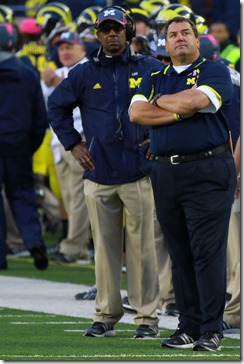 |
| The reason we thought Lloyd Carr would only be an interim head coach at first was he made Fred Jackson his first offensive coordinator, i.e. he replaced GARY EFFING MOELLER with a lifetime running backs coach/program glue guy. [photo: Fuller] |
At that point, rather than find a real OC, Lloyd promoted OL coach Mike DeBord (58). It's likely that had the defense not been enough to win a championship with just mediocre offense, DeBord would not have become as entrenched. Nevertheless Michigan spent half of its championship season doinking Chris Howard into stacked lines for two plays then passing on third down, succeeding just enough thanks to a couple of really shining young guys on the offensive line, and spot offensive duty by Woodson.
The DeBord who ran zone left all damn day in 2007 had been a wonderful offensive line coach before that. Prior to 1992 Michigan had Bo's de facto associate HC Jerry Hanlon as OL coach, and then Les Miles, except for a year Bobby Morrison (more on him later) coached it. Moeller hired DeBord after watching Northwestern's theretofore crap OL suddenly not suck in one year, and found a resume of just-as-quick turnarounds at Fort Hays State, Eastern Illinois, Ball State, and Colorado State in a matter of 10 years. From Runyan and Payne to Hutchinson and Backus, DeBord's OL were ready to insert after a year in the system, and usually ready for the NFL after three.
The problem was he approached offense coordination the same way: repetition, execution, toughness. Carr recommended DeBord to CMU as a training ground for eventually taking over Michigan, and when DeBord proved bad even by directional school standards (this was the disaster Brian Kelly remediated), Lloyd made room for him as special teams coach and recruiting guy. The loyalty to DeBord was the biggest complaint we had about Lloyd's tenure, and the caveman-style football they championed survives as a cancerous ideology within the program. As Carr's handpicked successor, DeBord is the personification of this complaint.
Michigan found a spot for him coordinating various non-revenue sports. This seemed nice and natural because dude did dedicate his life to Michigan, but something about DeBord being around now gives me the willies.
[After the jump: the rest of the staffs]
From left: Brady Hoke & Jerry Kill in 2011 [Upchurch], Les Miles and Cam Cameron at the 1989 spring game [Bentley], and James Franklin as a coordinator [courtesy Maryland Athletics]
For HTTV this year I did a study on Big Ten and SEC, and the factors that led to a marked disparity in football success that grew up between them since 1999. One of the most stunning differences I found was in the splashiness of coaching hires.
Someone on the board early this morning asked whether high-profile candidates are such a big deal. The original study answered this emphatically: "Yes!" I thought I'd extend it to the rest of the Power 5 hires since '99 and see if that's still true.
Methodology: I looked at the circumstances at the moment of hiring of every coach (156 total) who started a tenure at a currently Power 5 program since 1999, and put them into one of three (plus one) categories:
- Strong: Stealing another BCS school's coach, or the heir apparent at a power program, or grabbing the year's hottest candidate, or being the school that finally pries a legendary mid-major coach away when everyone else has been trying for years. Universally, these are headline-grabbing guys who probably needed a major monetary incentive to pry them from their last position.
- Average: A guy who was obviously responsible for turning a mid-major into a perennial 9- or 10-win team, a successful NFL or power program coordinator, promoting your own heir apparent (not after firing his boss), etc. These are the hires that you nod at and say "that makes sense" or "B+".
- Cheap: Promoting a coordinator you didn't plan on, grabbing a mid-major coach with mediocre success or success that's not obviously his. Grabbing a washout from the NFL or the Power 5, or a guy who wouldn't have been on any coaching radar except yours.
- (Interim): Don't count unless they were made full.
- These are of course debatable, since they're the opinions of one dude who's been obsessively following college football over this time period, so you can only draw so much. I didn't remember all of them, obviously, but I was able to jog my impressions by reading articles on coaching searches around the time. This is one instance when my life was actually made better by the annual proliferation of "we grade this year's hires" articles from mainstream outlets. When I couldn't decide, I defaulted "average."
- I welcome your suggestions for changes, so long as they fit the criteria (hindsight must be irrelevant).
- The data:
[After the jump: what we learned]
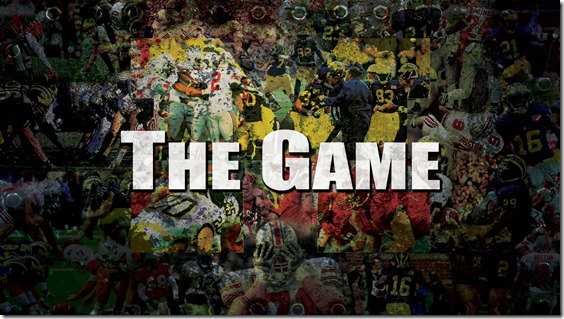

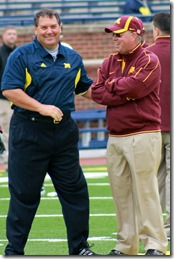
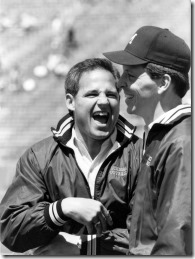
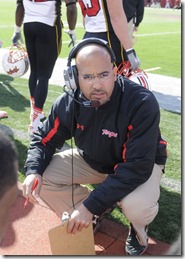
50